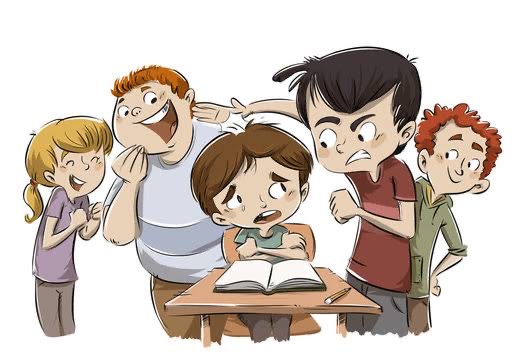A bully is habitually cruel or threatening to others who seem weaker or more vulnerable. They repeatedly abuse, hurt, or aggressively dominate the other person. In addition to being repetitive, it is also characterized by an imbalance of physical or social status and intent to hurt. Children who bully are likely to come from a position of perceived power, like being bigger physically, coming from a higher socioeconomic status, being a favourite with teachers, being popular in school and so on.
 Knowing your child is being bullied at school, on the playground, or online (cyberbullying) can be heartbreaking. This is when some parents say ‘if Bayo hits you, hit him back’ because you only get in trouble for starting a fight not for finishing one, right? Wrong. Worse still, it is difficult to accept that your child is the perpetrator of such harmful behaviour so you ‘defend them outside and tell them off at home, right?’ Wrong.
Knowing your child is being bullied at school, on the playground, or online (cyberbullying) can be heartbreaking. This is when some parents say ‘if Bayo hits you, hit him back’ because you only get in trouble for starting a fight not for finishing one, right? Wrong. Worse still, it is difficult to accept that your child is the perpetrator of such harmful behaviour so you ‘defend them outside and tell them off at home, right?’ Wrong.
WHY DO CHILDREN BULLY?
A common reason is to seek the attention they lack at home. It can also be to give them a sense of security, if they have been bullied, they simply do to others what they have experienced. Also, if there is an adult role model in their lives such as a parent, teacher, older sibling, who is a bully, they misinterpret the behaviour as normal and carry it on.
 It can also be because they are jealous of the other person and dominating them sends a false sense of security to keep them form being bullied themselves.
It can also be because they are jealous of the other person and dominating them sends a false sense of security to keep them form being bullied themselves.
WHAT DOES THE BULLY FEEL?
The bully feels a sense of power from making other children feel helpless. It is not always about the power play though, sometimes it is their ‘normal self’ because they do not know how else to socialize or communicate with others, so they act inappropriately.
 The bully wants to be liked and hailed by other children, especially those that they perceive as equals or superiors, so they make a show of being mean to more vulnerable children. More often, they just do not know how their actions make others feel, likely because they have not learnt compassion and respect.
The bully wants to be liked and hailed by other children, especially those that they perceive as equals or superiors, so they make a show of being mean to more vulnerable children. More often, they just do not know how their actions make others feel, likely because they have not learnt compassion and respect.
Children who bully are more likely to be abusive towards their loved ones, engage in criminal behaviour, or drop out of school due to increased truancy.
THE BULLIED CHILD
Bullying can leave deep and long-lasting emotional scars that can still influence the child’s life several years down the line.The bullied child is more likely to experience the following:
Children who witness repeated bullying feel powerless to stop it and may find themselves constantly living in fear and guilt.
 WHAT CAN YOU DO?
WHAT CAN YOU DO?

Dr Omowunmi H. Thanni is a physician with a medical degree from Olabisi Onabanjo University Ago-Iwoye (Mb.ChB. Ogun). She is an Infant and Childhood Mental Health enthusiast who is passionate about supporting children with mental health concerns.
She is also an Early Childcare practitioner with experience observing children dealing with grief, the various psychosocial presentations, and the impact on their families. She is also a Child and Family Volunteer who serves as a healthy support system for children and families who have experienced the loss of one or both parents to terminal illnesses.
She is devoted to debunking cultural myths surrounding childhood mental health and enlightening the community on proper prevention and intervention strategies.

